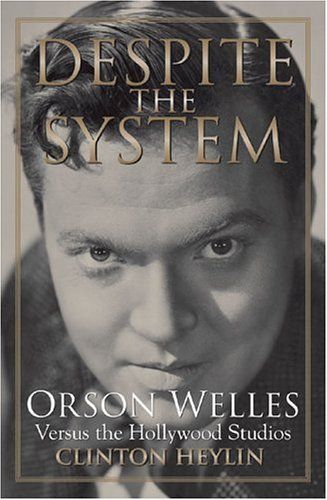As long as I’m posting messages from friends and messages about movies, here’s
one about another movie (more or less) from another friend, a guy who calls himself Mr. Cheer,
whom I’d tipped to Christopher Bray’s
review of Clinton Heylin’s new book, “Despite the System: Orson Welles versus the Hollywood
Studios,” in the Sunday (London) Times.
 Jan — Read the review, and he’s right. Genius or not, the Big Boy was the engineer of
Jan — Read the review, and he’s right. Genius or not, the Big Boy was the engineer of
his doom. I have an audiotape where his pals (John Houseman, notably, because he was the only
man who could control the boy wizard) reminisce about the early theatrical triumphs, when
Welles was dilatory and frequently drunk, but as magnetically inspirational as Jesus. In the sudden
discipline of live radio, where the clock was merciless, no escape, he would conduct gifted actors
in hastily improvised scripts, with few seconds to spare, and could inspire amazing compressed
performances, all on time. He would mount a podium, baton in hand, Svengali eyes like the
searching beam of a lighthouse, and guide something that existed only in his mind, making these
folks his hypnotized puppets. Then he would collapse, drink a flagon of Scotch, and eat about five
pheasants, feathers and all. An amazing character.
Thanks for re-opening the door to my Welles obsession. Thought I’d put it to sleep. My old
man took me to see “The Third
Man” in 1950, largely because he wanted to hear the zither
music of Anton Karras. (My old man’s mother played the instrument.) OK. But something
happened in that theater — I saw the knowing, witty, corrupt grin of Harry
Lime, and it’s never left me. A hideous introduction to the adult world. The
cat is at his feet, a car goes by, a window is opened, light is spilled — and there he is: Harry Lime.
Think about the name — that’s what they use to cover the disposable dead. Well sir, there is no
greater moment in all of movies, and Welles’s career follows Lime’s, except that Welles was
essentially an innocent. Doom, man, Doom.
— Mr. Cheer
As Mr. Cheer has often reminded me, Welles improvised Limes’s most celebrated piece of
dialogue in the great Ferris wheel scene when he’s confronted by Holly Martins (played by Joseph
Cotten) about his abhorrent criminal behavior (such as selling medicine on the black market, thus
depriving sick children of medication and resulting in many deaths). “In Italy,” Lime replies, “for
30 years under the Borgias they had warfare, terror, murder, bloodshed — but they produced
Michelangelo, Leonardo da Vinci and the Renaissance. In Switzerland they had brotherly love,
500 years of democracy and what did that produce? The cuckoo clock!”
